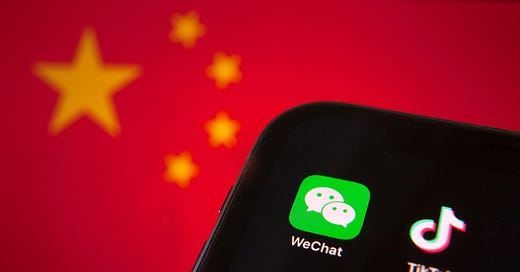Future Tech China: Why Bytedance Is Taking Tencent to Court
Plus: Cartier's canny courting of Gen Z, China to the rescue for Capri Holdings, and hongbao fever kicks in.
Published three times per week, the Content Commerce Insider newsletter highlights how brands create content to drive revenue, globally. If you have received our newsletter from a friend or colleague, we hope you will subscribe as well and follow us on LinkedIn and Instagram.
Whether it’s Christmas in the West or the upcoming Spring Festival in China, families love to fight. And guess which family loves the following?
Entertainment
E-commerce
Fintech
Suing each other
Answer: China's tech family. Tencent and Alibaba have played the role of bickering parents who can’t seem to get along. Bytedance is the rebellious but cool teenager. Happy holidays!
What Just Happened?
On February 2, Douyin announced that it had formally filed a complaint in the Beijing Intellectual Property Court, suing Tencent for alleged monopoly. Specifically, Bytedance is seeking $14 million from Tencent over the blocking of Douyin links from within Tencent’s WeChat.
Tencent, in true family feud fashion, says the allegations made by ByteDance are inaccurate and malicious, and that it plans to countersue, claiming that Bytedance violated user rights and is also blocking links to WeChat. Bytedance responded that it only blocks links to WeChat for certain content creators who post about healthcare and finance, arguing that these topics have high scam potential and could violate Bytedance’s guidelines.
That being said, financial videos are some of the most popular on Douyin (and now on TikTok as well), with over 100 million users engaging with finance-related content. He said, she said.
Messaging vs. Video
Even by the standards of China’s litigation-loving tech giants, Tencent and Bytedance are especially trigger-happy. Last year, Tencent-backed Kuaishou sued Bytedance for unfair competition. But their feuding extends further back: Tencent first sued a Bytedance-owned company in 2018, when it brought a defamation case against the Bytedance-owned news app Jinri Toutiao, demanding 1 yuan (15 cents) and an apology. Clearly a matter of principle, like many family squabbles.
But business positions are at stake here too. Bytedance and Tencent, like most of China’s biggest internet companies, are fighting on two key fronts: video and e-commerce.
For Tencent, that meant the launch last year of WeChat Channels, which allows users to create videos up to one minute in length. And unlike the private accounts that are WeChat’s hallmark, Channels encourages users to discover and follow others, opening the platform up to an unprecedented level. What a great idea. I wonder how they came up with that.
But WeChat Channels is to Douyin what Instagram Reels is to TikTok: too little, too late. Both Tencent and Facebook profit most from their existing user bases, and not so much from the features themselves. And Tencent also messed up when it initially only allowed creators to edit content from a PC (OK boomer…). Not only that, but its videos (unlike Douyin’s and Kuaishou’s) are not optimized for mobile. They can be square, horizontal, or vertical and are much more akin to an Instagram feed than Tiktok’s famously intuitive gesture-based interface.
In July 2020, WeChat founder Allen Zhang posted that Channels had amassed “200 million users” just a few months after its launch. But there was no mention of more concrete daily or monthly active user figures. And with Tencent’s 1.2 billion users, it’s easy to see how some might have unintentionally clicked into a Channels video or even just checked out the feature once, never to return.
Expect More Lawsuits
Bytedance’s Tencent suit is the first real battle since regulators introduced new rules late last year targeting monopolistic business practices by tech firms, and it’s likely to set the stage for a lot more litigation in the future. Bytedance isn’t yet at the point where it would be counted as a monopoly in either short video or other sectors, giving it a fair chance at winning in the current atmosphere of antitrust sentiment. Regular netizens are also siding with Bytedance, seeing the company as a David against Tencent’s Goliath.
- by Tanya Van Gastel
Mentioned in today’s newsletter: Baidu, Banciyuan, Bilibili, Burberry, Bytedance, Canada Goose, Cartier, JD.com, Jimmy Choo, Jinri Toutiao, LVMH, Lofter, MAC Cosmetics, Michael Kors, Pinduoduo, Quora, Richemont, Riot Games, Taobao Live, Tencent, Versace, Zhihu.
Cartier’s Content-Commerce Prowess Attracts a New Generation of Consumers in China
by Avery Booker
Nearly 30 years after entering the mainland Chinese market, Cartier has been an unlikely fast mover in adopting a comprehensive digital-first marketing strategy, helping the storied brand reach a new generation of millennial and Gen Z shoppers. Unlike its more traditional campaigns in Europe and North America, Cartier has shown a greater willingness to experiment in China, and it could see that market serving as a testbed for the initiatives to be rolled out globally in the years ahead.
One year after launching an official flagship store on Tmall Luxury Pavilion, Cartier has ramped up its digital efforts to capitalize on steadily rising demand for luxury watches and jewelry and product customization among younger consumers in China. Cartier was the first fine jewelry and watch brand to offer bespoke services such as engraving, gift-wrapping, and white-glove delivery services via Tmall, and it also participated in the platform’s custom marketing programs such as Tmall Hey Box (for new product releases) and Super Brand Day.
Cartier has also become an active player in e-commerce livestreaming, with a debut on Taobao Live ahead of last year’s Singles’ Day shopping festival that saw nearly 800,000 viewers tune in to an exhibition of more than 400 items promoted by guests such as Song Qian and Li Xian, with a lavish diamond necklace priced at RMB 190 million ($28.3 million) as the showstopper. The broadcast was a hit in e-commerce terms as well, recording more than RMB 100 million ($15.8 million) in sales. Soon after, Cartier once again took to livestreaming for a “city takeover” campaign in Shanghai to promote its new Pasha watch, broadcasting the VIP launch party and giving viewers access to exclusive brand content.
Despite controversy over its August 2020 Qixi campaign, Cartier has largely stayed on the good side of consumers in China, and there are indications that the brand has successfully managed to avoid the stigma of being perceived as an “older brand,” a label that can pose a challenge to global brands that have been active in China since the early 1990s. According to Alizila, China boasts the youngest clientele in the world for Cartier: Millennials make up an estimated 65% of its consumers in the market, while Gen Z accounts for another 25%. That’s especially surprising when we compare Gen Z’s relatively low spending power to that of Gen Xers, who would have first encountered Cartier in Beijing or Shanghai nearly three decades ago.
But those figures speak to Cartier’s effective use of digital marketing to reach and influence younger consumers via the celebrities, platforms, and shopping formats that matter most to them. And with parent company Richemont continuing to ink major deals aimed at positioning its portfolio for ongoing success in China (while fending off rival LVMH), Cartier could very well turn out to be an MVP in a critical market and offer examples of best practices for its global future.
For more on how Cartier has been winning on Chinese social media, see this case study on its recent Douyin campaign by Qumin’s Arnold Ma on Jing Daily.
China, Once Again, To The Rescue For Capri Holdings
This week, Capri Holdings — parent company of Michael Kors, Jimmy Choo, and Versace — announced its third-quarter fiscal 2021 results ended December 26, 2020, which reflect the ongoing negative effects of the COVID-19 pandemic on the global level, tempered by positive growth in mainland China.
According to a company release, Capri Holdings recorded total revenue of $1.3 billion for the quarter, a 17.1 decline compared to last year and a decrease of 19.5 percent on a constant currency basis. Gross profit reached $848 million, down from $934 million one year prior.
Despite expectations that lingering global economic uncertainty could suppress high-end spending throughout most of 2021 at least, the group’s results offer some relatively bright spots. Capri Holdings announced 65 percent growth in e-commerce sales in third-quarter fiscal 2021 and double-digit global retail growth at Versace. (Although the brand saw revenue remain flat compared to the prior year, and total revenue decreasing 6.7 percent on a constant currency basis.)
Portfolio brands Michael Kors and Jimmy Choo faced a very difficult quarter as well, with the former recording an 18.6 percent decrease in revenue compared to the prior year (20.6 percent on a constant currency basis) and the latter a 26.7 percent drop in revenue (27.3 percent on a constant currency basis).
Read the full story on Jing Daily.
Brand Collab Pick: Honor of Kings x Peking University
Higher education represents a new and largely untapped new front in China’s booming brand collaboration scene. After partnering with a range of top-tier consumer brands — from MAC Cosmetics to Burberry — Tencent’s Honor of Kings recently launched a strategic cooperation with the history department of Peking University (often called the “Harvard of China”).
The partnership involves working with two professors to jointly produce content for the game’s “Chang’An Competition Year,” named after the capital city for much of the Tang Dynasty (618-907), which is widely regarded in China as the peak of ancient civilization. In addition to providing input on the world of the game, the experts appear in a series of short video talks as guides to the culture of the period.
Tencent also released an immersive mobile VR tour of the game’s Chang’an scenery and launched a co-creation competition open to the general public in partnership with video streaming platform Bilibili, fan fiction site Lofter, and cosplay app Banciyuan covering the categories of art, design, video, and dance.
Honor of Kings ranks up there with Riot Games’s League of Legends as one of China’s most active gaming IPs involved in brand collaborations, and a university partnership makes perfect sense given that many of its players are students now old enough to play without government-mandated restrictions. By working with Peking University, the game’s brand is also able to boost its cachet through an association with the most aspirational of China’s higher education institutions and a source of national pride.
News From China
China’s content-fueled hongbao wars are in full swing ahead of the Year of the Ox. With Bytedance’s Douyin nabbing the coveted title of interactive sponsor for CCTV’s Spring Festival gala show on February 11, and promising to give away RMB 1.2 billion ($190 million) in virtual red envelopes (aka hongbao) to viewers during the broadcast, how are rivals measuring up? Incrementally, it seems.
Douyin plans to give away a total of RMB 2 billion ($300 million) during the holiday period, the same amount as last year, when it was the spendiest of China’s tech titans. Not to be outdone, Kuaishou intends to give out RMB 2.1 billion ($330 million), while Baidu seeks to top them all with RMB 2.2 billion ($340 million) in cash gifts. The holiday tradition that has become Chinese tech’s most tried-and-tested customer acquisition strategy is clearly holding strong.
While last year Kuaishou drew plenty of attention (and new users) with its sponsorship of the CCTV gala, this year it is taking a grassroots-style approach that’s more in line with its reputation as the people’s platform. Instead of partnering with CCTV or one of the “big five” satellite networks (Hunan, Beijing, Jiangsu, Zhejiang, and Dragon TV), Kuaishou announced that it will work with ten far less prominent provincial-level channels from places like Inner Mongolia in the north to Yunnan in the southwest. Kuaishou will integrate its short video IP with their programming while it spreads the wealth via hongbao to viewers in the process.
While the days surrounding the Lunar New Year are typically full of gala shows from networks across the country, this year the party is getting started a bit earlier. CCTV is adding a new youth-oriented, internet-themed celebration that will air on February 4, going head to head with entertainment powerhouse Hunan Satellite TV’s holiday extravaganza. Douyin is also the title sponsor for the Hunan TV gala, a commitment that was probably made before it got the last-minute CCTV partnership last month (after Pinduoduo, the previously announced CCTV sponsor, was forced to withdraw amid a PR crisis over employee deaths).
And while China’s big video streamers have yet to go all-in on producing their own Spring Festival galas, Tencent Video is offering its own take this year with a February 5 show that will bring together some of the platform’s most popular productions and their stars on stage for a holiday celebration of its IP power. “Family Annual New Year’s Eve FAN” (家族年年年夜FAN) will feature content from hit shows such as the idol competitions “Produce Camp” (创造营) and “The Coming One” (明日之子), costume drama “Romance of Tiger and Rose” (传闻中的陈芊芊), and stand-up comedy series “Deyun Comedy Fight Club” (德云斗笑社).
From Q&A to science fiction: While its closest analog in the English-speaking world is Quora, China’s Zhihu is really so much more, with content formats that run the gamut from product reviews to video lecture series and livestreams to web novels and audiobooks, offering robust opportunities for brands to engage in knowledge-based marketing.
Zhihu is currently engaged in a major multi-billion RMB push to increase its video footprint, and it looks like its plans are not limited to educational content. After celebrating its tenth anniversary recently with a short brand film, Zhihu has been adding more entertainment content. Last week it livestreamed a three-hour-long gala-style show, “Zhihu Answer Adventure Night” (知乎答案奇遇夜), covering subjects popular on the platform such as science, music, history, and Chinese culture, with JD.com as the title sponsor.
During the show, Zhihu teased its next major content innovation — a science fiction series. Dubbed the “Hanmei Project 2021” (寒梅工程 2021) few details have been released to date, but it appears to be based on a 2015 novel by He Xi and will star Li Guangjie, who appeared in the 2019 sci-fi blockbuster movie “The Wandering Earth” (流浪地). While the move is surprising, it also makes sense considering the strong overlap of Zhihu’s core user base and the growing audience for science fiction in China. “Hanmei Project 2021” will be the first of two original series produced by the Zhihu in the near future, and, given the wealth of ideas to be found in the platform’s wide-ranging Q&As, that could be just the start of a new knowledge-based entertainment empire.
News in English
Shanghai Fashion Week is reportedly being postponed from March to April as a result of a resurgence in Covid-19 infections in various parts of China, while brands such as Cartier and Canada Goose have been canceling in-person events in one of the few places in the world where they had still been possible. Vogue Business
With one year to go before the scheduled start of the 2022 Beijing Winter Olympics, there is still a great deal of uncertainty around prospects for the event, ranging from the coronavirus to international scrutiny over the treatment of Uighur Muslims in Xinjiang. SportsPro
Just days before Kuaishou’s hotly anticipated Hong Kong IPO, a Chinese copyright association said that it had found more than 155 million videos on the platform using unauthorized music and asked the company to delete an initial batch of 10,000 infringing videos. Reuters
Marketing for the Year of the Ox 2020: Executives in Asia share their thoughts on what matters to consumers during the pandemic-tinged Lunar New Year holiday. PR Week
From celebrities to monsters, a look at the stories brands are telling through film and video for the Lunar New Year. The Drum
As part of its major ongoing e-commerce push, Tencent is piloting out a new WeChat portal to centralize branded mini programs, although it still has some bugs to work out. KrAsia
Tencent also rolled out a slew of new WeChat features to boost user engagement, such as enhanced search functions, hashtags within chats, and livestreaming video. Emarketer
Alibaba reported a 52% increase in net income for the quarter ending on December 31, 2020 and is setting up a task force to review its businesses in light of an ongoing antitrust investigation. Wall Street Journal
And the grocery business has fueled Meituan’s rapid ascent to become China’s third most-valuable internet firm, with a market value surpassing $300 billion. Wall Street Journal
Former Vogue China editor-in-chief Angelica Cheung is joining VC firm Sequoia Capital, where she will focus on investments in China’s fashion, lifestyle, and entertainment sectors. WWD
The multi-channel network Ruhnn announced that it will delist from Nasdaq in a privatization by its parent company. PR Newswire
China’s top livestreamers are leveraging their selling power to launch their own brands. China Marketing Insights
The independent game distributor XD has been taking advantage of a feud between Tencent and Huawei as more Chinese developers seek out alternative platforms. Bloomberg
Authorities busted an alleged movie and TV piracy ring with ties to Renren’s online fan subtitling community. SCMP
We’ve Got China Covered
China Film Insider: China Wants to Mitigate Male “Feminization” With More Gym Class
Jing Daily: Why Storytelling Is the Key to Luxury’s High-Tech Future
Jing Culture & Commerce: What Now for Museums? MuseumNext’s 2021 Digital Summit Weighs In








